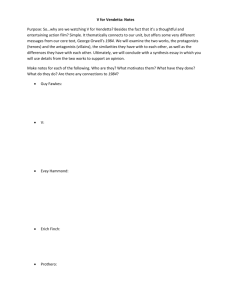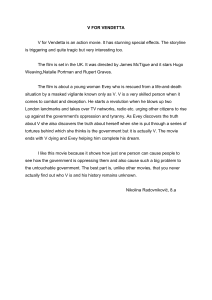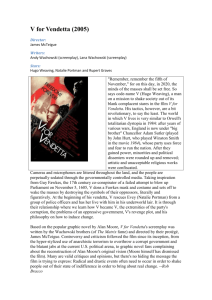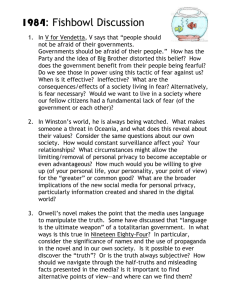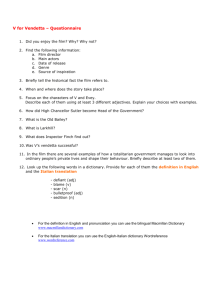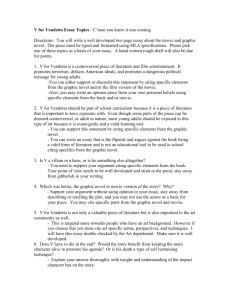IBDPLangBV for Vendettaworkbk
advertisement
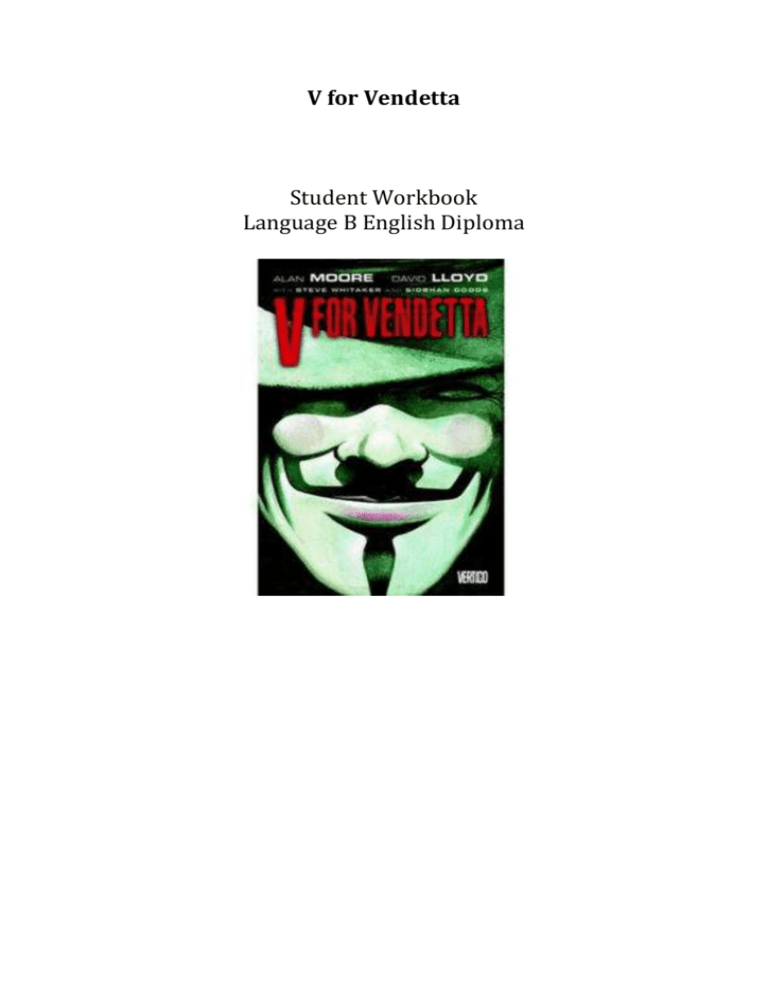
V for Vendetta Student Workbook Language B English Diploma V for Vendetta Historical and social context of the original novel In order to understand and appreciate the meaning of the novel you need to be aware of the context in which the novel was written. You should also consider the aims of the writers. Work in groups to research the following information: 1. 2. 3. 4. 5. 6. The Inspiration The themes and concepts – anarchy Portrayal of the fascists Style of V – Find out about the author and in particular his political views Find out about the context – what events in the 1980s shaped the setting and context Sources Refer to pages 272 – 274 of the novel to start your research http://www.youtube.com/watch?v=QX7ehbE1vc0 - BBC interview with Alan Moore who talks about V for Vendetta http://www.youtube.com/watch?v=FumNSfY7SfI - interview with Moore by Channel 4 news Supplementary internet sites to research http://www.youtube.com/watch?v=RTOQUnvI3CA and http://www.youtube.com/watch?v=1AF1Rofcf3k&feature=youtu.be - musical videos by Frankie Goes to Hollywood and Sting highlighting the nuclear threat posed by the Cold War relations between Soviet Union and the USA. Find definitions for the following types of ideology 1. Totalitarianism 2. Fascism 3. Anarchy V for Vendetta Summary – Chris Muise – Quick guide V for Vendetta is divided into three books, each with several chapters, all of which have titles featuring words that begin with the letter “V’. The story is set in a dystopian future 1997, where nuclear war has destroyed much of the world. Britain, however, survives under the cold, watchful eye of the Norsefire government, a fascist regime that took control amidst the chaos and confusion after the war. Norsefire undertook a campaign of ethnic and social cleansing, and keeps the populace in line through brutal punishment and constant observation through the omnipresent “Fate” computer system. No one dares oppose the Norsefire government, except one; a mysterious person fifted with enhanced strength, speed, and intelligence. He always wears a Guy Fawkes mask and identifies himself only as “V.” V comes across a meek 16 year old girl named Evey Hammond one night, whom he saves from members of the Norsefire secret police that she naively tried to proposition. V takes Evey under his wing, and forces her live in his secret base, the Shadow Gallery, as he systematically strikes at key members of the Norsefire party. It is revealed that V was likely the result of medical tests performed on his an an inmate of Larkhill Resettlement Camp that gave him enhanced physicality but also drove him insane. V escaped, and four years later, he targets his former captors and symbols of government oppression until all who could have identified him are dead. However, his vendetta is not merely a simple matter of revenge – he means to completely destroy Norsefire and free the people of London. Every is content living a carefree life with V, even though she is essentially his prisoner. Sensing potential in Evey that must be awakened, V fakes her capture at the hands of Norsefire and tortures her as he had been tortured, and slips her the notes of a former inmate of Larkhill that insprired his crusade. She becomes inspired as well and, when given the option to choose between her principles and her life, she chooses to die. V reveals the charade to Evey. He did this to free her from the confines of her own fear, and to prepare her to embrace his guiding principle: anarchy. V means to plunge all of London into anarchy by helping the people to find their voice again and topple their masters. All the while, V grooms Evey to become his replacement. Through increasingly bolder means, V cripples the government’s means of control, giving the citizenry the change to oppose the government themselves. However, most of the party’s undoing does not come at the hands of V directly, but rather the people his actions have affected and influenced. The party tears itself apart from the inside over plans of multiple coups, and the leader of Norsefire is assassinated by the disgraced widow of a high-ranking party member killed by V. Eventually, the entire city turns against its leaders and the city succumbs to chaos. In the final climax, however, V is killed, and Evey adopts his identity, ready to guide the people of London to rebuild their world anew. Literary analysis and discussion Book One – Europe after the Reign Allusion and Foreshadowing Allusion is the indirect reference to some other object, place, person or event. Foreshadowing is a technique that gives an indication of what may be presented in the text The following literature, events, people are mentioned or alluded to in Book One. Working in groups you should find information on the author or book or artist or event. Explain why you think Moore included the work or author or event in V for Vendetta 1. Title of Book One Europe after the Reign - Max Ernst – painting Europe after the Rains 2. Page 9,1,1 – Guy Fawkes Day 5th November 3. Page 9,7, – Movie Poster of Murders in the Rue Morgue 4. Page 9,7 – White Heat (movie poster) 5. Page 11, 10 – line from Shakespeare’s MacBeth 6. Page 54, 5 – Opening lines from Sympathy for the Devil by the Rolling Stones. Find out meanings for the following 4. Totalitarianism 5. Fascism 6. Anarchy Features of graphic novels The dialogue of the entire preface is the radio broadcast. What role do the graphics play in the preface? Refer to the features below when considering their role Frames/Panels – panels refer to the framed image. It offers the readers a perspective or point of view on the subjects also known as the camera angle. Gutters – Frames are clearly divided with gaps between the panels. These gaps which may or may not include white space are openly exposed. Readers tend to fill in the blanks and imagine what happens between panels. Fragmented – through Gutters and frames the graphic novel mimics the processes of memory, recollection and story-telling where we piece together disparate elements and attempt to provide a whole narrative but where gaps always remain. Collapsed time and space – the frames of a graphic novel can convey multiple time periods on a single page simultaneously. One frame or panel may be in the present while that to the left is in the future and that below is in the past. Analyzing bias News broadcasts are useful examples of the ways in which bias, persuasive language and propaganda are used to influence viewers/members of the public. Reasons for bias in writing 1. Political motive 2. Address a controversial issue 3. Maintain control over someone 4. Supporting a cause or a person 5. Feel a grievance Recognizing bias The following is the entire radio broadcast from the preface. Analyze the script using the following prompts: What is the purpose? (inform/persuade/criticize) Who is the author? Who is the audience? The reason for the bias. Identify the language choices that shape the bias. Consider the following:- emotive words exaggerations humour repetition use of adjectives building tension – how is this created? Quotations Language associated with a particular genre The radio broadcast from the Prelude Good evening London. It’s nine o’clock and this is the voice of Fate broadcasting on 275 and 285 in the medium wave. It is the fifth of the eleventh, nineteen ninety-seven. The weather will be fine until 12.07 am when a shower will commence, lasting until 1.30a.m. The temperature will vary between 13 and 14 degrees centigrade throughout the night. The people of London are advised that the Brixton and Streatham areas are quarantine zones as of today. It is suggested that these areas be avoided for reasons of health and safety. Productivity reports from Herefordshire indicate a possible end to meat rationing starting from mid-February 1998. The good news follows similar announcements concerning the increased production of both eggs and potatoes. Police raided seventeen homes in the Birmingham area early this morning, uncovering what is believed to be a major terrorist ring. Twenty people, eight of them women, are currently in detention awaiting trial. Queen Zara today appeared at the opening of a new waste-reclamation plant in Plaistow. This was the Queen’s first public appearance since her sixteenth birthday in June. The Queen was wearing a suit of peach silk created specially for the occasion by the royal couturier. In a speech today Mr Adrian Karel, Party Minister for industry stated that Britain’s industrial prospects are brighter than at any time since the last war. Mr. Karel went on to say that it is the duty of every man in this country to seize the initiative and make Britain great again. And that is the face of London tonight. We remind you that tomorrow is the final date for the completion of your census forms and the target date for the conclusion of the Deptford marsh clearance project. This is the voice of fate signing off. Have a pleasant evening. The key themes of the novel include: 1. 2. 3. 4. 5. 6. 7. 8. 9. 10. Power and control Political and personal freedom Free speech verses censorship Art and Literature’s power to lift the human spirit Totalitarianism Justice and revenge Personal Accountability, Happiness Identity, Individuality and the Idea Moral Ambiguity Anarchy v Fascism Which themes can you find in the radio broadcast? Support your answer with examples. As you read the novel, make notes of any examples of the themes above. Book One – chapter five - Versions 1. Imagine you are V writing a broadcast about blowing up the statue of justice OR Imagine you are Chancellor Adam Susan – write a broadcast to support your beliefs 2. Imagine you are V writing a radio broadcast about the events he has described including the concentration camp and the roles played by Dr. Surridge, the Archbishop and Lewis. Book Two – This Vicious Cabaret Reminder of key themes The key themes of the novel include: 1. 2. 3. 4. 5. 6. 7. 8. 9. 10. Power and control Political and personal freedom Free speech verses censorship Art and Literature’s power to lift the human spirit Totalitarianism Justice and revenge Personal accountability and Happiness Identity, Individuality and the Idea Moral Ambiguity Anarchy v fascism Find examples that support the development of the key themes above. Speech writing - p112 from the graphic novel Example 1 - V goes on TV and makes a broadcast - speech (p112) introduction to conventions of speech writing I thought it time we had a little talk Are you sitting comfortably? Then I'll begin (telling a story) I suppose you're wondering why I've called you here this evening Well, you see, I'm not entirely satisfied with your performance lately… I'm afraid your work's been slipping and… and..well, I'm afraid we've been thinking about letting you go Oh, I know, I know. You've been with the company a long time now. Almost…let me see. Almost ten thousand years! My word, doesn't time fly? It seems like only yesterday… I remember the day you commenced your employment, swinging down from the trees, fresh-faced and nervous, a bone clasped in your bristling fist… 'Where do I start, sir?' You asked, plaintively. I recall my exact words: 'There's a pile of dinosaur eggs over there, youngster,' I said smiling paternally the while. 'Get sucking.' Well, we've certainly come a long way since then, haven't we? And yes, yes, you're right, in all that time you haven't missed a day Well done, thou good and faithful servant. Also, please don't think I've forgotten about your outstanding service record, or about all of the invaluable contributions that you've made to the company… But…well, to be frank, we've had our problems, too. There's no getting away from it Do you know what I think a lot of it stems from? I'll tell you… It's your basic unwillingness to get on within the company. You don't seem to want to face up to any real responsibility, or to be your own boss Lord knows , you've been given plenty of opportunities We've offered you promotion time and time again, and each time you've turned us down 'I couldn't handle the work, guv'nor,' you wheedled. 'I know my place.' To be frank you're not trying, are you? You see you've been standing still for far too long and it's starting to show in your work… And I might add, in your general standard of behaviour. The constant bickering on the factory floor has not escaped my attention… nor the recent bouts of rowdiness in the staff canteen. Then, of course there's… hmmm.. well, I didn't really want to have to bring this up, but well, you see, I've been hearing some disturbing rumours about your personal life. No, never you mind who told me, no names, no pack drill I understand that you are unable to get on with your spouse. I hear that you argue. I am told that you shout. Violence has been mentioned. I am reliably informed that you always hurt the one you love the one you shouldn't hurt at all. Example 2: Alliteration - speech • Voila! In view, a humble vaudevillian veteran, cast vicariously as both victim and villain by the vicissitudes of fate. This visage, no more veneer of vanity, is a vestige of the vox pupuli, now vacant, vanished. However, this valorous visitation of a bygone vexation stands vivified, and has vowed to vanquish these venal and virulent vermin vanguarding vice and vouchsafing the violently vicious and voracious violation of volition. The only verdict is vengeance; a vendetta held as a votive, not in vain, for the value and veracity of such shall one day vindicate the vigilant and the virtuous. Verily, this vichyssoise of verbiage veers most verbose vis-à-vis an intrdouction, so let me simply add that it’s my very goo d honour to meet you and you may call me V. see extract from film: http://www.youtube.com/watch?v=IQyqx1K495U Example 4: The Revolutionary speech from the film http://www.youtube.com/watch?v=KKvvOFIHs4kSo Political relevance Book Three We learn more about V’s views on Anarchy and Chaos. Consider – is he right? Moore himself wrote: “I actually don't think it's right to kill people. So I made it very, very morally ambiguous. And the central question is, is this guy right? Or is he mad? What do you, the reader, think about this? Which struck me as a properly anarchist solution. I didn't want to tell people what to think, I just wanted to tell people to think, and consider some of these admittedly extreme little elements, which nevertheless do recur fairly regularly throughout human history." (Moore) V for Vendetta: Political resonance – fiction resonating in reality The social implications of the story remain compelling – and not as unambiguous as you might assume Sam Jordison theguardian.com, Protesters wearing Guy Fawkes masks gather outside St Paul Cathedral in London. Photograph: Ben Stansall/AFP/Getty Images When V for Vendetta was announced as the subject of this month's Reading group, a reader called Sunburst called it "The finest, most intelligent and most relevant British novel of the last 25 years". . V for Vendetta: New Edition . by Alan Moore, David Lloyd . . Buy the book All of that is, of course, debatable (right down to timescale: in fact, some of the book is more than 25 years old). Yet there's truth in what he says. It is a good book, it is smart, and there's no doubt that it remains relevant – as TheOldRedDog pointed out: "The thing I'd be most interested to see in the comments from the group is the reaction to the fact that when Alan Moore wrote V for Vendetta, he was working to the logical extension of the then-Thatcherite world and creating an all too prosaic and realistic portrayal of 'what could be'. Now that we have another Tory administration in power and the financial crisis has shown us that the powers that be back then never really went away, are the resonances simply déja-vu, or something else?" Many other commenters noted that TheOldRedDog isn't strictly correct. Moore actually assumed the Tories were going to lose the 1983 election, and that Labour would remove nuclear weapons from British soil – thus paving the way for the avoidance of nuclear catastrophe that engulfs the rest of his unhappy world. (He has since readily admitted that such predictions were "naive".) But even so, there's no doubt that the evils of the British Tory party and Thatcherism were preying on Moore's and Lloyd's minds when they created the book – as they've both often confirmed in interviews. Here is Moore in conversation with a comic fan around the time of the release of the V for Vendetta film: "They were talking less about annihilating whichever minority they happened to find disfavour with and more about free market forces and market choice and all of these other kind of glib terms, which tended to have the same results as an awful lot of the kind of fascist causes back in the 1930s, but with a bit more spin put upon them. The friendly face of fascism." Make of that what you will, but there's no denying that much of V for Vendetta cuts close to the bone, especially now we're enjoying a bout of Conservative rule. The excellent TheOldRedDog again: "I think it is this that Alan Moore was trying to get to – it doesn't take much to pierce the thin veneer of civilisation, and once we do we won't necessarily find mindless barbarism, but something far more insidious." City bonuses, closing libraries, Nadine Dorries. It rings true, all right. But as TheOldRedDog's comment also suggests, there's far more to the book than anti-Thatcher allegory. MadameDeath said: "In my humble opinion, V is a book about satanism and anarchism. Most readers miss that point, but V's actions certainly point to that area, which Moore is more than familiar with. Makes it all the more entertaining when you see thousands of protesters wearing the V mask." Quite a few people disagreed with MadameDeath about the satanism, but it seemed an influence to me, too. Especially thanks to the repeated quotations from Aleister Crowley ("Do What Thou Wilt Shall Be The Whole of The Law") and that odd moment when V grows horns … The anarchy, meanwhile, is undeniable – and that undoubtedly adds a certain something to the current use of the V mask as a symbol of protest. Of course, there's every chance that plenty of protesters don't know what the mask was originally about, but I think it would be wrong to assume too much ignorance. Certainly, the Anonymous movement seems to have borrowed more from V for Vendetta than just a cool symbol. Their videos, for a start, seem to replicate V's speech patterns – not to mention the staging used for similar transmissions in the book and the film. The many-headed nature of Anonymous – where the end result is more important than the individual bringing it about – also chimes with the denouement of V for Vendetta, as does their apparent desire to change world institutions by spreading a little well-aimed chaos and fear. Apparently, Alan Moore himself is pleased. He told Entertainment Weekly: "I was also quite heartened the other day when watching the news to see that there were demonstrations outside the Scientology headquarters over here, and that they suddenly flashed to a clip showing all these demonstrators wearing V for Vendetta masks. That gave me a warm little glow." But my favourite soundbite comes from an interview with David Lloyd carried out by the Comics Alliance. "What does it feel like," they asked him, "to have been part of creating a character that, years later, still stands as a symbol of rebellion?" He replied simply: "Good." Which brings us back to Sunburst's original comment. The book is still relevant. It has as much to say about our times as it does the 1980s. What did it say to you?
